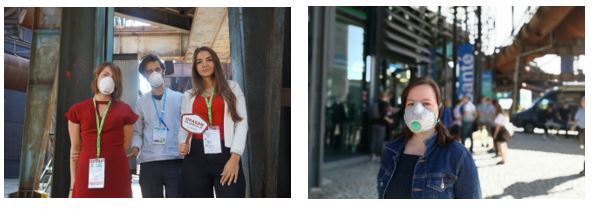The EU’s proposed 2040 climate target to reduce domestic emissions by 90% - while allowing up to 3% to be met through international carbon credits – risks undermining health protections. The Health and Environment Alliance calls on member states to strengthen their climate commitments in order to protect health, rather than delay and weaken overdue action.
Ostrava, 15 June 2017 – HEAL does community monitoring on the Road to WHO Environment and Health Ministerial conference

To increase citizens’ engagement and more speedy action to improve Europe’s air, HEAL carried out personal exposure monitoring from its Brussels office to Ostrava, Czech Republic, where the 6th Ministerial Conference on Environment and Health organised by the World Health Organization is taking place this week. Improving air quality is one of the seven priorities featured in the Ministerial Declaration that will be adopted at the conference.
Although the monitoring devices showed fairly good air quality in Brussels, Prague and Ostrava (1), this is not the case many days of the year across Europe’s cities.
Genon K. Jensen, HEAL Executive Director, said: “We find air pollution well above the WHO limits in many areas in Europe, around 90% of EU citizens living in cities are exposed to levels considered harmful to health by the World Health Organization (2).”
With HEAL’s support, citizens can take the matter into their own hands where official monitoring of air quality is lacking, inform themselves about their personal exposure to pollution and take steps to protect their health and ask local authorities to act faster to make their cities breathable again.
“The WHO event could not take place in a more fitting setting when it comes to the issue of environmental health – Ostrava has the most polluted air in the Czech Republic, and is among the worst polluted places in Europe,” explained Miroslav Šuta from the Czech Centre for Environmental Health. “While the situation in other Czech areas improved significantly with ecological legislation in the 1990s, that has not been the case for the Ostrava region. Therefore, NGOs are seeking to implement an effective air quality action plan that would protect the health of the inhabitants of Ostrava and the Moravian-Silesian region.”
Ostrava has one of the highest P10 levels in the Czech Republic, with an annual mean level in 2013 of 41 µg/m3 compared with a level of 27 in Prague (3). Exposing people to harmful levels of air pollution increases the risks of heart disease, lung cancer, respiratory diseases and stroke (4), but also affects mental health and well-being (5), with children, elderly and ill people being especially vulnerable.
It also eats into the economy, with a growing number of work days lost and an economic cost of 20,900 million USD a year (6) for the Czech Republic, and 1,431,499 USD millions (7) in the WHO European Region in 2010.
Yet Ostrava is not alone in facing this public health challenge. In many European cities and regions, citizens and lawyers have started to hold their governments responsible, demanding action against air pollution and even taking them to court, with Brussels being one prominent example (8).
Liévin Chemin, Lead of the Mobility & Air Quality Unit in the Brussels city movement organisation BRAL added: “Through taking action and assessing air pollution themselves, citizens are incredibly empowered and become the centre point of advocacy on the issue, by raising awareness, spreading information and engaging actively in health-environment policy creation.”
Find out more about the Unmask My City campaign and HEAL’s work on air quality, including the most recent briefing on how choosing the right energy forms can contribute to better health (available in English, Polish and Czech).


